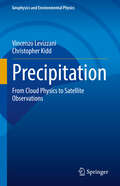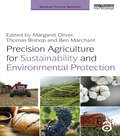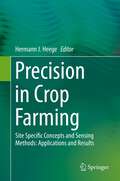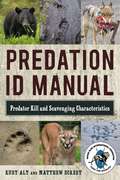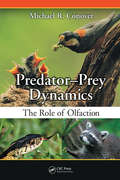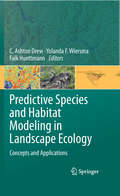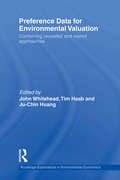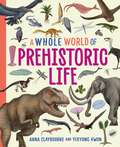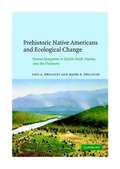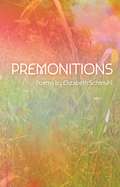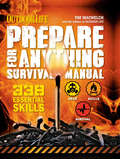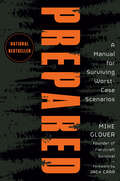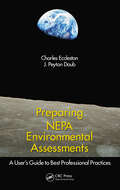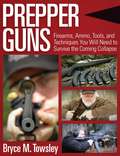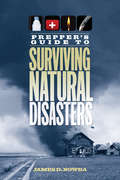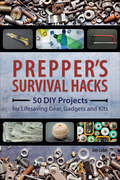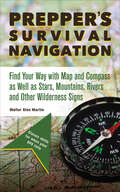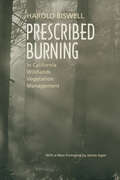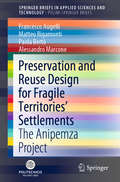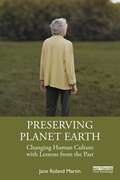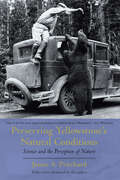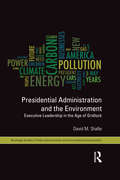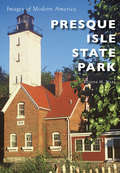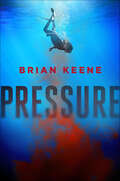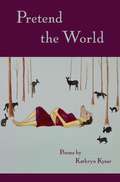- Table View
- List View
Precipitation: From Cloud Physics to Satellite Observations (Geophysics and Environmental Physics)
by Vincenzo Levizzani Christopher KiddThis book provides a comprehensive and in-depth exploration of the physics involved in the formation of precipitation in the Earth's atmosphere. It begins by emphasizing the significance of precipitation in the Earth system and climate. Cloud physics is incorporated to provide readers with the essential physical background necessary to understand the process of hydrometeor formation within clouds. Subsequently, the intricate structure of precipitation systems is elucidated, aiding readers in comprehending the mesoscale and synoptic characteristics of precipitation organization. The book concludes with a section on precipitation observation and measurements, which examines various sensors, such as gauges, radars, satellites, and platforms. These networks enable access to global precipitation data for meteorology and climate analysis. Designed to meet the needs of graduate and PhD students in fields such as geophysics, meteorology, climate science, hydrology, environmental sciences, water management, and geography, this book is also valuable for researchers and professionals from diverse disciplines who require a solid understanding of precipitation products for their work. Although the book requires a fundamental understanding of classical physics (including dynamics, thermodynamics, electricity, and magnetism), as well as a basic grasp of inorganic chemistry, its content remains accessible and informative for readers with diverse levels of expertise.
Precision Agriculture for Sustainability and Environmental Protection (Earthscan Food and Agriculture)
by Margaret A. Oliver Thomas F. A. Bishop Ben P. MarchantPrecision agriculture (PA) involves the application of technologies and agronomic principles to manage spatial and temporal variation associated with all aspects of agricultural production in order to improve crop performance and environmental quality. The focus of this book is to introduce a non-specialist audience to the the role of PA in food security, environmental protection, and sustainable use of natural resources, as well as its economic benefits. The technologies covered include yield monitors and remote sensing, and the key agronomic principles addressed are the optimal delivery of fertilizers, water and pesticides to crops only when and where these are required. As a result, it is shown that both food production and resource efficiency can be maximized, without waste or damage to the environment, such as can occur from excessive fertilizer or pesticide applications. The authors of necessity describe some technicalities about PA, but the overall aim is to introduce readers who are unfamiliar with PA to this very broad subject and to demonstrate the potential impact of PA on the environment and economy. Chapter 3 of this book is freely available as a downloadable Open Access PDF under a Creative Commons Attribution-Non Commercial-No Derivatives 3.0 license. https://s3-us-west-2.amazonaws.com/tandfbis/rt-files/docs/Open+Access+Chapters/9780415504409_oaChapter_3.pdf
Precision in Crop Farming: Applications and Results
by Hermann HeegeHigh yields and environmental control in crop farming call for precise adaptations to local growing conditions. Treating large fields in a uniform way by high capacity machinery cannot be regarded as a sustainable method for many situations. Because differences existing within single fields must be considered. The transition from former field work carried out manually or by small implements to present-day high-capacity machinery caused that the farmers lost the immediate and close contact with soils and crops. However, modern sensing and controlling technology can make up for this deficit. High tech methods that include proximal sensing and signals from satellites can provide for controls that allow adjusting farming operations to small fractions of one ha and sometimes even down to some m2, hence in a site-specific mode. This applies to operations for soil cultivation, sowing, fertilizing and plant protection. This book deals with site-specific concepts, applications and results.
Predation ID Manual: Predator Kill and Scavenging Characteristics
by Kurt Alt Matthew EckertPart of the challenges and rewards of being a field biologist is being able recreate a predation event. But that experience is often difficult and frustrating, as time, weather, and other factors can be make clues sparse. Even the most careful of investigators can spend hours of time second-guessing themselves while exhausting every possibility from inconclusive evidence.The Predation ID Manual is designed to help assuage some of those difficulties by providing the reader with practical, expert advice, including:• A step-by-step approach for gathering evidence.• Suggestions of what to focus on at carcass site• A template of terminology to use when classifying a predation• A guide for investigating and determining signs of hemorrhage • Signs of kill and kill sites by species, including deer, elk, and lynx• And dozens more tipsWith a waterproof cover and sturdy pages, the SCIF’s Predation ID Manual is a must have for every serious hunter and field biologist.
Predator-Prey Dynamics: The Role of Olfaction
by Michael R. ConoverHumans, being visually oriented, are well versed in camouflage and how animals hide from predators that use vision to locate prey. However, many predators do not hunt by sight; they hunt by scent. This raises the question: do survival mechanisms and behaviors exist which allow animals to hide from these olfactory predators? If so, what are they, a
Predictive Species and Habitat Modeling in Landscape Ecology
by Falk Huettmann Yolanda F. Wiersma C. Ashton DrewMost projects in Landscape Ecology, at some point, define a species-habitat association. These models are inherently spatial, dealing with landscapes and their configurations. Whether coding behavioral rules for dispersal of simulated organisms through simulated landscapes, or designing the sampling extent of field surveys and experiments in real landscapes, landscape ecologists must make assumptions about how organisms experience and utilize the landscape. These convenient working postulates allow modelers to project the model in time and space, yet rarely are they explicitly considered. The early years of landscape ecology necessarily focused on the evolution of effective data sources, metrics, and statistical approaches that could truly capture the spatial and temporal patterns and processes of interest. Now that these tools are well established, we reflect on the ecological theories that underpin the assumptions commonly made during species distribution modeling and mapping. This is crucial for applying models to questions of global sustainability. Due to the inherent use of GIS for much of this kind of research, and as several authors' research involves the production of multicolored map figures, there would be an 8-page color insert. Additional color figures could be made available through a digital archive, or by cost contributions of the chapter authors. Where applicable, would be relevant chapters' GIS data and model code available through a digital archive. The practice of data and code sharing is becoming standard in GIS studies, is an inherent method of this book, and will serve to add additional research value to the book for both academic and practitioner audiences.
Preference Data for Environmental Valuation: Combining Revealed and Stated Approaches (Routledge Explorations In Environmental Economics Ser. #31)
by John Whitehead Tim Haab Ju-Chin HuangThe monetary valuation of environmental goods and services has evolved from a fringe field of study in the late 1970s and early 1980s to a primary focus of environmental economists over the past decade. Despite its rapid growth, practitioners of valuation techniques often find themselves defending their practices to both users of the results of applied studies and, perhaps more troubling, to other practitioners. One of the more heated threads of this internal debate over valuation techniques revolves around the types of data to use in performing a valuation study. In the infant years of the development of valuation techniques, two schools of thought emerged: the revealed preference school and the stated preference school, the latter of which is perhaps most associated with the contingent valuation method. In the midst of this debate an exciting new approach to non-market valuation was developed in the 1990s: a combination and joint estimation of revealed preference and stated preference data. There are two primary objectives for this book. One objective is to fill a gap in the nonmarket valuation "primer" literature. A number of books have appeared over the past decade that develop the theory and methods of nonmarket valuation but each takes an individual nonmarket valuation method approach. This book considers each of these valuation methods in combination with another method. These relationships can be exploited econometrically to obtain more valid and reliable estimates of willingness-to-pay relative to the individual methods. The second objective is to showcase recent and novel applications of data combination and joint estimation via a set of original, state-of-the-art studies that are contributed by leading researchers in the field. This book will be accessible to economists and consultants working in business or government, as well as an invaluable resource for researchers and students alike.
Prehistoric Life (A Whole World of... #1)
by Anna ClaybourneGet lost in the diverse and bustling world of prehistoric life - with more to explore than you ever imagined!A Whole World of Prehistoric Life presents the stunning breadth of animal and plant varieties that filled prehistoric Earth. Which types of animal could swim or fly? When did flowers start appearing? Where do the dinosaurs fit into all of it? Which living things look familiar, and which look absolutely alien? This book has the answers and so many more facts filling the beautifully illustrated pages.A Whole World of is a book series looking at the extraordinary diversity of life on Earth - the defining features and evolutionary branches - and encourages readers age 7 and up to consider why it is important to maintain biodiversity. Written by award-winning author, Anna Claybourne, with artwork by award-winning illustrator, Yekyung Kwon.Books in the series:A Whole World of Mammals/A Whole World of Prehistoric Life/A Whole World of Minibeasts/A Whole World of Birds/A Whole World of Rocks and Minerals/A Whole World of Plants and Fungi
Prehistoric Native Americans And Ecological Change: Human Ecosystems In Eastern North America Since The Pleistocene
by Paul A. Delcourt Hazel R. DelcourtThere has long been controversy between ecologists and archaeologists over the role of prehistoric Native Americans as agents of ecological change. Using ecological and archaeological data from the woodlands of eastern North America, Paul and Hazel Delcourt show that Holocene human ecosystems are complex adaptive systems in which humans have interacted with the environment on a series of spatial and time scales. Their work therefore has important implications for the conservation of biological diversity and for ecological restoration today, making it of great interest to ecologists and archaeologists alike.
Premonitions (Made in Michigan Writers Series)
by Elizabeth SchmuhlVisceral and brimming with vitality, the poems in Premonitions reverberate with the voice of a woman on a secluded farm, confronting her emotional and physical isolation. Drawing on her own experience as a daughter of a third-generation fruit farmer, Elizabeth Schmuhl gives readers a fresh and powerful perspective on what it means to be alive. Layering one upon another, the poems blur boundaries and create a volatile state out of which the remarkable and unexpected occur. Embracing chaos, change, and unpredictability, these poems are energetically charged and infused with succinct, imagistic language. They reach beyond the constraints assigned to the female form and examine a place where time, the body, sexuality, and the natural world are not fixed. At times surreal, at others painfully real, the poems in Premonitions are the expression of a human life that merges and melds with the world around it, acting and reacting, loving and despairing, disintegrating and rebuilding. The speaker travels fluidly between strata of the natural world and her own body. Adding to the complexity of her poems, Schmuhl creates additional layers of meaning as the poems and their titles relate to the author’s synesthesia, a sensory phenomenon through which letters and numbers are experienced as colors and emotions. Premonitions will turn the reader inward, encouraging the examination of the small details of life and a growing acceptance of the perpetual turmoil and uncertainty of existence despite our own desire to find a firm footing. This volume will be prized by lovers of contemporary poetry and literature alike.
Prepare for Anything Survival Manual: 338 Essential Skills (Outdoor Life)
by Tim MacWelch The Editors of Outdoor LifeThe New York Times bestselling author and survival expert covers hundreds of skills and strategies to help you be ready when disaster strikes.If you’re concerned that the world is becoming increasingly unstable, you are far from alone. From natural disasters to terrorism, pandemics, and economic collapse, there are a whole host of catastrophic events to be concerned about. And preparing for the worst is going mainstream.Outdoor Life: Prepare for Anything will take you through a wide range of potential threats and how you can prepare for them, from having the right gear on hand to knowing what to do in the wake of a disaster. This is the book for the growing prepper movement, with hands-on hints, easy-to-use checklists, and engaging first-person stories to break down the crucial do’s and don’ts, educate yourself on various threats, and help to ensure that you ride out whatever Mother Nature, the government, foreign powers, or modern society can throw at you.Includes vital information on:• How to prep for a natural disaster, economic collapse, or societal restructuring.• What should be stocked in your house, pantry, basement, bunker, and go-bag.• How to handle yourself and your family in the wake of disaster, from creating a plan to leading your neighborhood watch.
Prepared: A Manual for Surviving Worst-Case Scenarios
by Mike GloverA former Green Beret&’s indispensable course in preparedness, teaching the keys to building a resilient and fearless lifeMost people think that being prepared for catastrophe means stocking up on MREs and building a bunker in their backyard, but this approach leaves you vulnerable in the real world of car accidents, natural disasters, grid failures, and global pandemics. Prepared overturns today&’s paranoid survival wisdom and teaches the foundational skills of preparedness that will not only help you build situational awareness and achieve greater mobility but that will also help you build resilient mental habits.After 20 years in the US Army, Special Forces, and as a government contractor for the CIA, Mike Glover has trained thousands of men, women, and families in the art and science of survival. In this book, he shows you how to: • Harness your brain chemistry to eliminate the freeze response and increase your stress tolerance during a crisis • Fortify your home by learning how to use and store essential foods, water, supplies, first aid, and ammunition in your everyday life • Equip your vehicle with sufficient first aid, so you can respond to injuries even before an ambulance arrives—dramatically increasing your chance of survival in an accidentDrawing on Glover&’s most dire experiences in combat and in the real world, this book shows you how almost no disaster is more powerful than someone who is truly prepared. For Glover, surviving catastrophe is not about fearing crisis, but creating more resilient habits so that you can be ready for whatever comes your way.
Preparing NEPA Environmental Assessments: A User's Guide to Best Professional Practices
by J. Peyton Doub Charles EcclestonThe National Environmental Policy Act (NEPA) regulations provide surprisingly little direction for preparing environmental assessments (EA). This book addresses this problem by providing a step-by-step guide for preparing EAs. Bridging the regulatory gap, it draws on information scattered throughout NEPA regulations and guidance documents, as well as best professional practices (BPP) and case law. The book progresses from the fundamentals to successfully more advanced topics, making it suitable for beginners, students, and experienced practitioners alike. It provides an indispensable guide for managing, analyzing, and writing legally defensible EAs.
Prepper Guns: Firearms, Ammo, Tools, and Techniques You Will Need to Survive the Coming Collapse
by Bryce M. TowsleyFood, water, and shelter are very important to survival. But you must also be ready to protect what is yours, because if somebody stronger, better prepared, and better equipped takes it all away, you will die. Your family will die. The only way to protect them is with firearms.Written with the law-abiding civilian in mind, Prepper Guns covers the firearms and tools needed to survive, not only for defense, but also for foraging. It is a comprehensive look at the realities of the firearms a prepper should have. Written by Bryce M. Towsley, a firearms expert and a full-time gun writer with thirty years of experience, it steps away from the "conventional wisdom” that is often spouted by prepper publishing and takes a hard, honest, look at the reality of the firearms, ammo, tools and training needed to survive at home and on the road.Prepper Guns takes a careful look at each category of firearms, ammo, sights, and accessories. Other topics include gun care and maintenance, as well as some simple gunsmithing and reloading to keep firearms repaired and ammo on hand. Finally, Prepper Guns has training suggestions and drills, plus a look at the psychology of survival, using the expertise of some of the top people in the world in these fields.If you are worried that bad things are coming and are trying to prepare, this book is the most important piece of gear you can buy. Because if you can’t protect your family, your food and your home, nothing else really matters.
Prepper's Guide to Surviving Natural Disasters: How to Prepare for Real-World Emergencies
by James D. NowkaReal disasters - floods, fires, tornadoes, hurricanes, chemical spills - occur every year. Prepper's Guide to Natural Disasters skips the hype and hysteria of less likely, apocalyptic scenarios and helps you understand, prepare for, and survive real threats to your family and home - events that affect hundreds of thousands of people every year. The Prepper's Guide to Natural Disasters helps you assess the real threats in your part of the country, then provides clear, detailed solutions to help you prepare for and survive these events.
Prepper's Survival Hacks: 50 DIY Projects for Lifesaving Gear, Gadgets and Kits (Preppers)
by Jim CobbDiscover ingenious tips, tricks and techniques for turning ordinary objects into survival gear from the author of Prepper’s Communication Handbook.When a catastrophic event strikes, you’ll need to rely on your skills and supplies to keep you alive. This book teaches you how to improvise solutions for the scarcities, deficiencies, and dangers that will arise in a worst-case scenario.Prepper’s Survival Hacks offers a wide range of creative ideas for transforming cheap and widely available items into life-saving gear:Harvest water in a transpiration bagCatch food with a pocket fishing kitCook using a handy hobo stoveCraft quick fire starters in an egg cartonMake a mini oil lamp using a mint tinAssemble a survival kit in a belt pouch
Prepper's Survival Navigation: Find Your Way with Map and Compass as well as Stars, Mountains, Rivers and other Wilderness Signs (Preppers Ser.)
by Walter Glen MartinAn easy-to-understand primer on time-tested navigation techniques that work when your GPS failsWhen disaster strikes and your GPS is useless, ancient navigation techniques will ensure your survival. With this book, you can easily travel through even the farthest, remotest places. Utilizing tips from US Army manuals and lifelong wilderness experts, you&’ll learn lifesaving navigation techniques, including how to:• Orient yourself using a topographical map• Find north using a compass, shadows and stars• Calculate distance using landmarks and pace count• Navigate unfamiliar terrain using dead reckoning• Travel in low visibility with a navigator and point person• Use landscape features to pinpoint locationThis definitive guide to terrain navigation also teaches you essential survival skills like fire craft, water procurement and shelter making.
Prescribed Burning in California Wildlands Vegetation Management
by Harold BiswellHarold Biswell's decades of research and field experience were a major factor in developing policies of controlled or prescribed burning, which mimics or reintroduces the natural fire cycle. This comprehensive study introduces the principles and practices of prescribed burning, which apply far beyond California, within a historical and ecological perspective. Available for the first time in paperback, with a new foreword by James Agee, this book places Biswell's study—and his legacy—in the context of recent developments in the field.
Preservation and Reuse Design for Fragile Territories’ Settlements: The Anipemza Project (SpringerBriefs in Applied Sciences and Technology)
by Francesco Augelli Matteo Rigamonti Paola Bertò Alessandro MarconeThis book reports on an architectural conservation and reuse project in Anipemza, an Armenian Soviet-era village on the Turkish border, just a few steps away from the important Yererouyk archaeological site. Based on current tourist trends, the book suggests the development of a social system and micro-economic reactivation model to endorse the territory’s numerous cultural resources and preserve the memory of the village that housed the genocide orphanages and the many other stories associated with the village. Further, the development of sustainable tourism will lead to an improved relationship between locals and visitors. Examining the development of a system of strategies able to cope with the existing social, economic and hygiene problems as well as the architectural preservation aims, the book provides valuable guidelines for the local community.
Preserving Planet Earth: Changing Human Culture with Lessons from the Past
by Jane Roland MartinThis book encourages readers to acknowledge humanity’s contribution to the environmental crisis, proposing a way forward by exploring the power of ordinary people to bring about large-scale cultural change.Is it possible for humankind to change its ways and shed the belief that the planet is ours to do with as we like? Internationally acclaimed philosopher of education Jane Roland Martin argues that "humancentrism" is a learned affair, and what is learned can be unlearned. Turning to the past to see how large-scale cultural change has occurred, she discovers a pattern in the achievements of such historical luminaries as Martin Luther, Mahatma Gandhi, Rosa Parks and Greta Thunberg that we too can follow. Drawing on history, philosophy, and literature as well as the natural and social sciences and hoping to mobilize readers to effective action, Martin employs an accessible and powerful rhetoric, with each chapter beginning with a scene from history written in dialogue form.This book calls on young and old to avert a looming tragedy of Aristotelian proportions--the demise of the “Mother Nature” that made it possible for our species to flourish. Thoroughly interdisciplinary in its approach, it will appeal to students and teachers as well as general readers interested in environmental studies, philosophy, and education.
Preserving Yellowstone's Natural Conditions: Science and the Perception of Nature
by James A. PritchardPreserving Yellowstone&’s Natural Conditions describes in fascinating detail the historical origins and development of wildlife management in Yellowstone National Park, alongside shifting understandings of nature in science and culture. James A. Pritchard traces the idea of &“natural conditions&” through time, from the introduction of this concept by early ecologists in the 1930s. He tells several overlooked stories of Yellowstone wildlife, including a sensational scientific hunt for bears with bow and arrow, and the episode of the predator pelicans, which facilitated a fundamental shift toward protection of all wildlife in Yellowstone, and for the National Park Service as a whole. A prolonged debate regarding the elk herd on Yellowstone&’s northern range is addressed, along with the origins of the notion of natural regulation, and the reasons for ending direct reductions of elk. This story emphasizes how ecological science came to Yellowstone and to the National Park Service, subsequently developing over a period of decades. In the new afterword to this book Pritchard summarizes recent developments in wildlife science and management—such as the &“ecology of fear&” and trophic cascades—and discusses historical continuities in the role of the park as a wildlife refuge and the inestimable values of the park for wildlife conservation.
Presidential Administration and the Environment: Executive Leadership in the Age of Gridlock (Routledge Studies in Public Administration and Environmental Sustainability)
by David M. ShafieAfter sweeping environmental legislation passed in the 1970s and 1980s, the 1990s ushered in an era when new legislation and reforms to existing laws were consistently caught up in a gridlock. In response, environmental groups became more specialized and professional, learning how to effect policy change through the courts, states, and federal agencies rather than through grassroots movements. Without a significantly mobilized public and with a generally uncooperative Congress, presidents since the 1990s have been forced to step into a new role of increasing presidential dominance over environmental policies. Rather than working with Congress, presidents instead have employed unilateral actions and administrative strategies to further their environmental goals. Presidential Administration and the Environment offers a detailed examination of the strategies and tools used by U.S. presidents. Using primary sources from presidential libraries such as speeches and staff communications, David M. Shafie analyzes how presidents such as Bill Clinton and George W. Bush have used alternative executive approaches to pass environmental policies. From there, Shafie presents case studies in land management, water policy, toxics, and climate change. He analyzes the role that executive leadership has played in passing policies within these four areas, explains how this role has changed over time, and concludes by investigating how Obama’s policies compare thus far with those of his predecessors. Shafie’s combination of qualitative content analysis and topical case studies offers scholars and researchers alike important insights for understanding the interactions between environmental groups and the executive branch and the implications for future policymaking in the United States.
Presque Isle State Park (Images of Modern America)
by Eugene H. WareLocated on a seven-mile peninsula on the shores of Lake Erie in Erie, Pennsylvania, Presque Isle State Park attracts four million visitors each year. With its designation in 1921, Presque Isle became the second state park in Pennsylvania. From this beginning, the citizens of Erie and surrounding areas developed an affinity and appreciation for the park. Presque Isle hasbeen left relatively unchanged over the years, and when improvements have been made, they have been executed in ways that have not altered the park's natural beauty. Through images gathered from the collections of the author, Erie County Historical Society, Pennsylvania Department of Conservation and Natural Resources, and various other local sources, Presque Isle State Park reflects the history and unique atmosphere of a park that has come to be known as "a place for all seasons."
Pressure
by Brian KeeneOff the coast of tropical Mauritius, an ecological catastrophe with global implications is occurring. The ocean's floor is collapsing at a rapid rate. World-champion free diver and marine biologist Carrie Anderson joins a scientific expedition determined to discover the cause-and how to stop it. But what they uncover is even more horrific. Deep beneath the surface, something is awake. Something hungry. Something...cold. Now, the pressure builds as Carrie and her colleagues must contend with the murderous operatives of a corrupt corporation, an unnatural disaster that grows bigger by the day, and a monstrous predator that may spell the extinction of all mankind.Pressure is this summer's hot new thriller from bestselling author and World Horror Grandmaster Award winner Brian Keene.
Pretend the World
by Kathryn KysarPretend the World confronts our false sense of safety in our self-created worlds. From her St. Paul kitchen to the historical shores of Lake Superior, from an airplane above Bagdad to a clothing factory in Guangdong, Kathryn Kysar pretends the glimmering and the sordid in these honest, searing poems that explore the inequities, cracks, and fissures in women's constructed lives.Kathryn Kysar is the author of Dark Lake (Loonfeather Press, 2002), a book of poetry, and is the editor of Riding Shotgun: Women Write About Their Mothers (Borealis Books, 2008). She has received fellowships from the National Endowment for the Humanities and the Anderson Center, and she has published poems in many anthologies and magazines, including Great River Review, Mizna, and Painted Bride Quarterly. She serves on the board of directors for the Association of Writers and Writing Programs.
